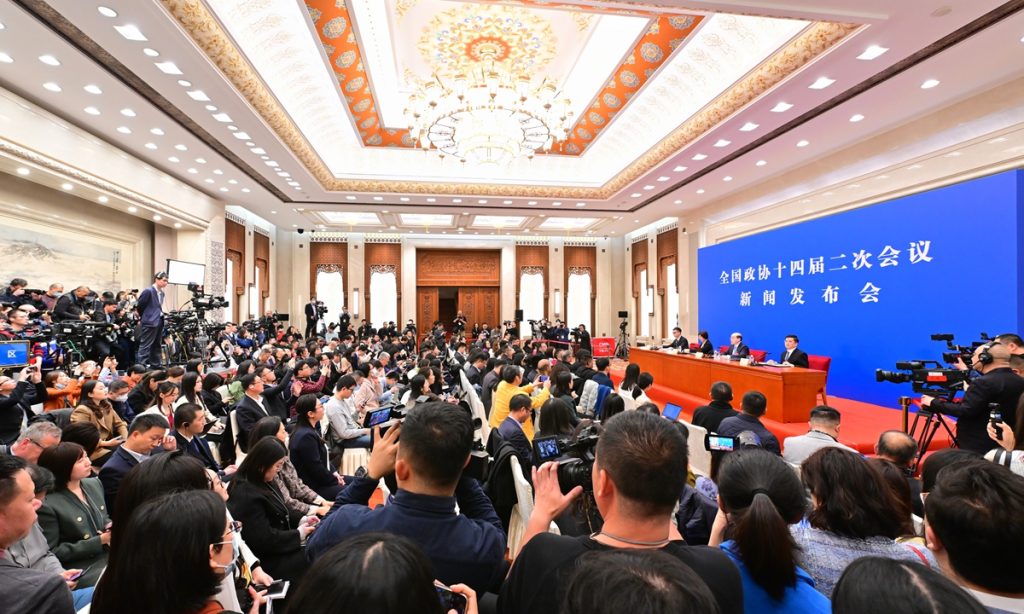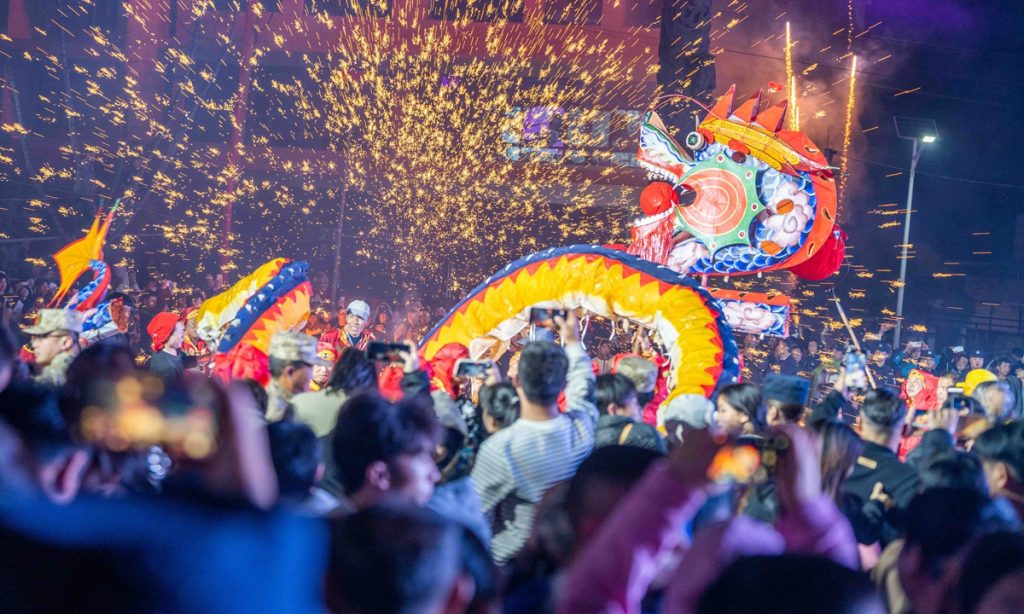China’s securities regulator vows to protect small investors' interests, strengthen market regulation
China’s securities regulator vows to protect small investors' interests, strengthen market regulation
China’s securities regulator vows to protect small investors' interests, strengthen market regulation

The 14th National Committee of the Chinese People's Political Consultative Conference (CPPCC), China's top political advisory body, kicked off its second session on Monday, marking the start of the annual two sessions. The second session of the 14th National People's Congress (NPC), the country's top legislature, is set to open on Tuesday.
This year's political gatherings carry extra weight for the Chinese economy, as 2024 will be a crucial year for the realization of the goals and tasks of the 14th Five-Year Plan (2021-25), and the new government is set to submit its Government Work Report to the NPC annual session for deliberation for the first time.
The session usually reviews past achievements and sets development targets for the current year and beyond.
At a time when mainstream Western media outlets are flooded with reports of China grappling with various difficulties - deflation, a property crisis, mounting debt burdens and a foreign capital exodus - the two sessions will serve as a crucial window for the world to observe the country's economic development and understand its policy direction for the year ahead, which Western media outlets said investors are watching closely for signals of a "bazooka-like stimulus."
It's not unusual to see Western media outlets run bearish reports badmouthing the Chinese economy around the major political event every year. For instance, a report published by the Financial Times on February 27, 2023, was headlined "The implications of China's mid-income trap," while CNN ran an article entitled "China's economy had a surprisingly good start to the year, but it may not last" in March 2022.
Yet, China still accomplished its 2023 GDP growth target despite downward pressure and challenges, and the underlying trends of a rebound in the economy and long-term growth remain unchanged. Such economic fundamentals further prove that the ill-intentioned "China collapse" theory cannot withstand the test of time.
Why have Western predictions about a hard landing for the Chinese economy never come true? The key lies in the inability to understand that China's economic development has its own rhythm and policy direction, which will not be influenced by Western hype. The reason why the two sessions are of great importance to China's economy is not only because of the GDP target issued during the meetings, but also because of the policy direction set for achieving stable economic development in the year ahead.
There is no denying that China's GDP target has been the focus of world attention, which is not surprising given its huge economic size and important implications for the global economy. The Chinese government has always stressed the importance of the quality of economic development, rather than just the growth rate, but GDP, as a major measure of a country's economic strength, is still one of the most important economic metrics in China.
It is true that China's economic growth has slowed in recent years amid unprecedented and complicated domestic and external market challenges. This is mainly because the economy is undergoing a period of adjustment and transformation. Despite the difficulties and downward pressure, China is still on a solid footing and its GDP growth rate remains relatively fast among the world's major economies.
If anything, China's consistent economic performance over the years is the best proof that it has the ability to transform its economy while maintaining growth momentum.
During China's two sessions, much attention is often paid to the country's GDP growth target. However, it is crucial to look beyond mere numbers and understand the implications of new policies and measures to be implemented by the Chinese government to address economic challenges. Because the policy direction not only promises positive influence on China's economic prospects, but also presents opportunities in the country's future development.

The Chinese economy is resilient, has huge potential and vitality and its growth momentum will continue to strengthen and lead to a bright future, according to a spokesperson for the Second Session of the 14th National Committee of the Chinese People's Political Consultative Conference (CPPCC).
Economic issues have been a focal point for political advisors ahead of the gathering, and it is the opinion of all political advisors that in 2023 the Chinese economy withstood the external pressure and overcome internal difficulties, and the economy has been on a general recovery track, according to Liu Jieyi, spokesperson for the second session of the 14th CPPCC National Committee.
There is a good foundation and favorable conditions for promoting high-quality development and the long-term positive economic trend will continue to be consolidated and strengthened, Liu said, responding to a question about the current status of the Chinese economy.
Solid progress has been made in achieving major social and economic growth targets, high-quality development and Chinese way of modernization in 2023, Liu said.
The CPPCC held quarterly seminars on the country's macroeconomic situation and in-depth consultations on the stable operation of the overall economy, with topics ranging from fiscal, monetary, employment and headline economic policies, and provide suggestions and strategies to stabilize market expectations and boost investor confidence, according to Liu.
Biweekly consultations meetings were held on fostering the high-quality development across the financial sector and promote the stable and sound development of the property sector and field trips were made to promote the high-quality development of the private economy, strengthen the digital transformation of small and medium-sized enterprises, and improve the resilience and safety level of the industrial and supply chains.
The CPPCC also arranged study trips to small and medium-sized banks to help tackle the risks of smaller financial institutions and provide advice on implementing the task mapped by during the Central Economic Work Conference held in December.
Its suggestions on fostering new-quality productive forces were highly valued and in many cases adopted by relevant government departments, Liu said.
The second session of the 14th National Committee of the CPPCC will begin on March 4.
China's economy grew 5.2 percent year-on-year in 2023, finishing above last year's official GDP target of around 5 percent, and underscoring the resilience and potential of the Chinese economy in the post-COVID-19 era.

Escalating US trade protectionism, and its behavior of politicizing economic issues and erecting more trade barriers to affect fair competition, will only harm the development of its own auto industry in the long run, He Yadong, a spokesperson of China's Ministry of Commerce (MOFCOM), said on Thursday.
Chinese cars are popular in the global market because of their innovative features and high quality rather than alleged low-price dumping, He said, responding to a question over media reports saying that the Alliance for American Manufacturing had asked the US government to block the import of low-cost Chinese automobiles and auto parts from Mexico.
In addition, a Reuters report said on Wednesday that Republican US Senator Josh Hawley has introduced legislation to hike tariffs on Chinese vehicle imports amid so-called concerns about the potential competitive impact on American car companies.
In recent years, the US side has erected barriers to thwart Chinese car imports, like levying additional tariffs, excluding Chinese car brands from US government procurement and implementing discriminatory subsidy policies, He said.
While the US erects barriers to hinder Chinese carmakers, China is always open to carmakers from across the world, He said.
US carmakers have fully enjoyed the dividends of China's huge market, with the sales volume of American brands far outpacing Chinese brands in the US. Protectionism by the US will only hinder its own auto industry's development in the long run, He said.
The MOFCOM spokesperson urged the US to respect the rules of the market economy and the principle of fair competition while correcting its non-market practices in order to build a fair environment for the long-term development of the auto industry.
The EU has also stepped up trade protectionism against Chinese automobiles, and recently, the EU's antitrust regulator launched an investigation into Chinese trainmaker CRRC Qingdao Sifang Locomotive, a subsidiary of CRRC Corp, the world's biggest producer of rolling stock.
Cui Dongshu, secretary-general of the China Passenger Car Association, told the Global Times that the protectionist moves of the US and EU violate the WTO principle of fairness, and robust exports of Chinese new-energy vehicles (NEVs) reflect the strong international competitiveness of China's industry chains rather than so-called subsidies.
In China, the subsidy granted to NEVs was completely phased out as of the end of 2022. In order to maintain fair competition, provinces across China were required to stop subsidies for NEVs starting from 2018, and subsequently, national subsidies were phased out in an orderly fashion, Cui said.
Cui is positive about the development of China's NEV sector on the back of its strong innovation capability, complete manufacturing system and strong supply chains.
China's vehicle exports surged 57.9 percent year-on-year to a record of 4.91 million in 2023 as the country's automakers expanded their presence overseas, according to data from the China Association of Automobile Manufacturers.
China-US economic and trade cooperation is a stabilizing force in bilateral relations. The Chinese side is willing to join hands with the US to implement the important consensus reached at the San Francisco meeting between the two heads of state to jointly promote the steady and healthy development of China-US economic and trade relations, Chinese Vice Commerce Minister Wang Shouwen said when meeting with a US Chamber of Commerce delegation led by the chamber's President and CEO Suzanne Clark in Beijing on Tuesday.
China will unswervingly promote high-level opening-up and it is hoped that member companies of the US Chamber of Commerce will continue to be deeply rooted in the Chinese market and achieve win-win development, Wang said.

German auto giant Volkswagen Group has signed an agreement with Xpeng, a Chinese electric vehicle (EV) maker to co-develop new EV models tailored for Chinese market, where broad consumers are embracing clean, environment-friendly cars.
The two parties agreed to commence strategic tech collaboration, bundling their respective strengths to explore the dynamic Chinese market, and will co-develop two intelligent internet-connected vehicles tailored for Chinese consumers, according to a statement sent from Volkswagen Group to the Global Times on Thursday.
The agreement includes the joint purchase of vehicle equipment and auto parts, in addition to the use of innovative technologies in auto design and engineering.
The first two EV models are scheduled to hit the road in 2026, with one planned to be a sport utility vehicle, Volkswagen said.
Ralf Brandstätter, a board member of Volkswagen AG for China region, said China is the world's largest and fastest-growing EV market, noting that the partnership with XPeng increases economic competitiveness of vehicle production in a price sensitive market environment.
He Xiaopeng, chairman and CEO of XPeng, said the company will provide Chinese consumers with the best EV products combining Volkswagen's vehicle making and engineering capability and XPeng's smart EV technology.
In December 2023, Volkswagen completed the acquisition of shares amounting to 4.99 per cent of the total issued and outstanding share capital in XPeng, following the announcement of the partnership in July 2023.
Another Chinese EV maker Nio in December last year signed a pact for an investment of $2.2 billion with Abu Dhabi-based CYVN Holding. And, Dutch automaker Stellantis NV also announced in October 2023 to invest 1.5 billion euros to acquire approximately 20 percent of China's EV start-up Leapmotor, underlining the advantage and competitiveness of China's EV manufacturing.
At the end of 2023, China’s population was 1.4097 billion, a decrease of 2.08 million from the previous year, with urban permanent residents totaling 932.67 million. The annual new births reached 9.02 million, while deaths hit 11.1 million, resulting in a natural growth rate of -1.48‰: official statistics

Saturday marks China's traditional Lantern Festival, the 15th day of the first lunar month of the Year of the Dragon. On the day that concludes the two-week-celebration of the Chinese New Year, the nation's consumption performance is set to prolong the buying fever seen in the Spring Festival holidays.
The consumption vitality at the beginning of the year across sectors such as retail, tourism and entertainment underscored the recovery of the national economy, experts noted, and the positive result will be reflected in the official statistics at the end of the first quarter of 2024.
A Beijing resident surnamed Huo told the Global Times on Friday that her family saw long queues at stores to buy yuanxiao, a festive sweet-favored glutinous rice ball, to celebrate the Lantern Festival.
"Due to the extremely high demand for yuanxiao around the festival, some popular stores in Beijing sold out their daily inventory in just one morning," said a Beijing resident surnamed Li, noting that there were a lot of customers queuing in front of the store from early morning.
A staff member from a food store in Beijing said that the daily sales volume of yuanxiao reached 10,000 to 15,000 kilograms in recent days. The largest sales volume reached 40,000 kilograms and customers had to wait in line for 40 minutes, local media outlet Beijing Business Today reported.
As the Lantern Festival is not a holiday but falls on a weekend, catering and entertainment sectors are expected to receive large number of consumers for gatherings of family and friends, Zhang Yi, CEO of iiMedia Research Institute, told the Global Times on Friday.
Online retail platform Meituan told the Global Times that as of Wednesday, the number of restaurants launching yuanxiao-themed set menus increased by 55 percent week-on-week, and the volume of related orders surged by over 165 percent.
"The surging pre-order volume for restaurants, as well as the high customer volume at cinemas and shopping malls across the country, proves that national consumption is still running at a high level," said Zhang.
During the eight-day Spring Festival holidays, China witnessed record figures for domestic travel and spending, with both figures largely exceeding those of the same period in 2019 before the outbreak of the COVID-19 pandemic.
According to data released by the Ministry of Culture and Tourism on February 18, a total of 474 million domestic trips were made during the eight-day holiday, up 34.3 percent year-on-year, and total domestic tourism spending jumped by 47.3 percent year-on-year to about 632.69 billion yuan ($87.91 billion).
Multiple travel hubs, including the Hong Kong-Zhuhai-Macao Bridge and the Xishuangbanna Railway Station in Southwest China's Yunnan Province all reported new record on daily passenger volume during the holidays.
China's total box office also reached an 8.034-billion-yuan record during the holiday, according to box office tracker Dengta. Notably, the average film ticket price fell below 50 yuan from the 52.3 yuan in the 2023 Spring Festival holidays, indicating that more people were willing to spend money on the entertainment sector.
As the Spring Festival holidays in 2023 and 2024 fall in January and February respectively due to the lunar calendar, some year-on-year data may not be useful as a reference, Li Yong, a senior research fellow at the China Association of International Trade told the Global Times on Friday, while noting that the economic operation data for the first quarter of 2024 will see growth based on the current momentum and will provide a precise projection for China's economy operations.
The spokesperson for China's Ministry of Commerce (MOFCOM) He Yadong said in a regular press conference held on Thursday that China has seen a boom in consumption during the Spring Festival holidays, making a good start to 2024. The MOFCOM vowed to further organize a series of consumption promotion activities and fully implement measures to expand consumption.
"Consumption is set to contribute more to economic growth in the first quarter of 2024 thanks to a series of festivals, as we can see the consumer price is driven up by social consumption demand, and the CPI and PPI of the first quarter of 2024 will record upsurges," said Li.

Apple's long-awaited mixed-reality headset, the Vision Pro, is a hot topic in the tech world ahead of its coming debut at the US Apple Store on February 2. Extensive media attention has been drawn to the complex supply chain behind the Vision Pro hardware, with many saying that China's supply chain plays a significant role in its manufacturing. Some industry insiders claim that Chinese mainland companies account for about 60 percent of the supply chain.
Some Western media outlets, which habitually take a biased view of China, have recently published articles suggesting that Apple is likely to move a massive chunk of its production capacity from China to India. It is undeniable that China's labor costs have risen, leading to supply chain restructuring. However, some Westerners tend to exaggerate the risks faced by China's manufacturing industry and deliberately ignore its positive aspects.
Publicly available information indicates that China plays an irreplaceable role in the production of Apple's most advanced products, such as Vision Pro. Apple has described Vision Pro as a revolutionary spatial computer that seamlessly blends digital content with the physical world. It showcases Apple's latest generation technology.
Although the West has been hyping global manufacturers' reduced dependence on China, it's indisputable that China's manufacturing capacity has still provided strong support for Western corporations, including Apple.
Apple has a big year ahead for new products, but it also faces challenges. The Vision Pro headset is Apple's first new product category since it launched its Apple Watch series in 2015. However, analysts do not expect Apple to generate significant revenue from the Vision Pro, at least in the short term, due to its high price that may deter many potential customers.
As reported, the Vision Pro starts at $3,499 with 256GB of storage, while the 512GB model is priced at $3,699 and the most-spacious 1TB version is priced at $3,899. Whether the Vision Pro's prices will fall after going into mass production will be the key to capturing more market share, especially in China and other developing markets. Many types of smart glasses have been launched in the Chinese market, and most of them are significantly cheaper than Apple's Vision Pro.
If Apple can effectively utilize China's manufacturing advantages and further collaborate with China's supply chain, its competitiveness in mixed-reality headsets will be strengthened. It's highly likely that China's well-established industry chain could help Apple reduce manufacturing costs for its Vision Pro.
It is precisely because of such abundant cooperation opportunities that shares of some mixed-reality companies in the A-share market experienced a surge in recent trading after pre-orders for Apple's Vision Pro began on January 19.
Apple's development in the Chinese market and the upgrading of China's manufacturing industry are mutually beneficial. While Apple enjoys the advantages of Chinese manufacturing and its market, it could also bring opportunities for the upgrading of China's manufacturing industry.
Chinese supply chain companies are favored by Apple due to their flexibility and strength. During the development of prototypes for the Vision Pro headset, they have been able to meet Apple's innovative demands, according to media reports.
Through collaborating with Apple to develop innovative products, the quality and efficiency of China's manufacturing industry upgrading will undoubtedly be greatly enhanced. Apple can stimulate innovation in the Chinese supply chain by meeting the market demand for innovative products, accelerating its innovation and upgrading, and promoting industrial upgrading and transformation. This cooperative relationship will bring more development opportunities and competitive advantages for China's manufacturing industry.
The vast and dynamic market, strong manufacturing industry foundation and continuous innovation momentum in China are compelling reasons for Apple or any foreign company to embrace production in China to achieve sustainable growth.
The New York Times wrote in an article entitled "How China Has Added to Its Influence Over the iPhone" in September 2022 that "the critical work provided by China reflects the country's advancements over the past decade and a new level of involvement for Chinese engineers in the development of iPhones."
For Apple's ambition to develop innovative products and win future markets, it is essential to embrace the accelerated upgrading of Chinese manufacturing.

One Boeing 737 MAX flying from Seattle has arrived at the Guangzhou Baiyun International Airport in South China's Guangdong Province on Saturday, flight information provider VariFlight revealed on Saturday.
The delivery ends a nearly five-year freeze since China suspended most orders and deliveries of Boeing planes in 2019 following two fatal crashes of the 737 MAX in other countries.
Information shared with the Global Times shows that the plane, operating under the flight number of CZ5073, has joined the China Southern Airlines fleet.
The delivery of the Boeing 737 MAX comes at a moment as the US plane manufacturer is in its turmoil.
Reuters reported that the US Federal Aviation Administration on Wednesday tightened pressure on Boeing by barring the troubled planemaker from expanding production of its best-selling 737 MAX narrowbody planes, following "unacceptable" quality issues.
Boeing CEO Dave Calhoun faced questions from senators on the Alaska Airlines incident in a series of meetings on Wednesday on Capitol Hill. Senate Commerce Committee chair Maria Cantwell said she would hold hearings to investigate the root cause of Boeing's safety lapses, according to Reuters.
Regarding the delivery of MAX series in China, China's Foreign Ministry said on Thursday that the Boeing 737 MAX8 model has met delivery requirements set by Chinese regulators as of December 8 of 2023.
Before the delivery of MAX, a 787-9 Dreamliner ordered by Juneyao Airlines had been delivered in December of last year, and it is also the first time since November 2019 that Boeing has delivered a 787 Dreamliner plane to a Chinese airline.
China is regarded one of the most rapidly developing aviation markets in the world, as Boeing forecast in September of last year that China will need 8,560 new commercial airplanes through 2042, driven by economic growth well above the global average and increasing public demand for air travel.
Chinese home-developed C919 aircraft also gear up the flying in China. China Eastern Airlines said on Saturday that all the C919 aircraft it received are being put into the Chinese New Year's travel rush.
China to launch “2024 Spring Breeze” plan, aiming to create 30 million jobs from late Jan to early Apr: ministry